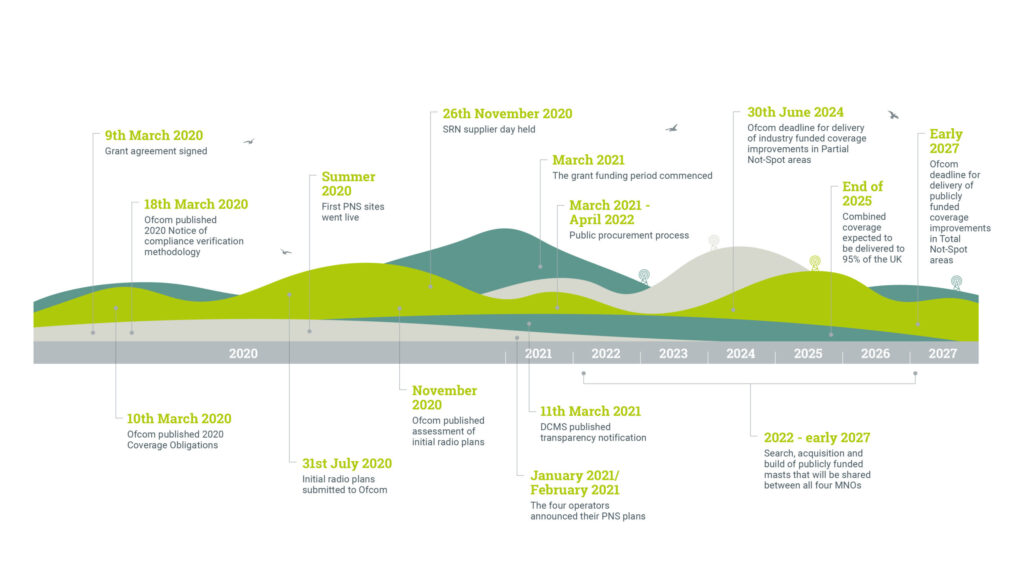Shared Rural Network – a key infrastructure project from Johnson’s premiership – to miss first-phase deadline
The UK newspaper, The Daily Telegraph, reports that Vodafone, Three and Virgin Media O2 have asked the government for up to two more years to complete the first stage of the Shared Rural Network (SRN).
Complex targets
The SRN was intended to for the operators between them to provide 4G to 95% of the UK by the end of 2025. This was to be achieved by £500 million in public funding plus £532 million from the operators, and to allow reciprocal sharing of existing masts in some areas and building and sharing new masts in others.
The overall 95% target requires service from at least one operator per site: only 84% of sites need to offer 4G coverage by all four operators by the end of 2025. To add to the complications, different parts of the UK have different goals. In England, 4G coverage from at least one one operator is supposed to cover 98% of England (pciture shows Dent Head Viaduct, North Yorkshire), but 91% of Scotland, 95% of Wales and 98% of Northern Ireland.
Coverage by all four mobile operators drops to 90% in England, 74% in Scotland, 80% in Wales and 85% in Northern Ireland.
The SRN’s goals included to provide guaranteed coverage to 280,000 more UK premises plus along 16,000km of roads and boost ‘in car’ coverage on around 45,000 km of road, and better indoor coverage for around 1.2 million premises. Individually, each operator will aim to reach 90% geographic coverage.
Note that BT, which owns EE, has wider coverage and more masts than its rivals. The deal struck with the government for phase one is mostly to upgrade existing sites. No agreement was reached about the other three mobile operators been able to share EE’s sites.

Source: Shared Rural Network
Policy failures
The SRN was a major plank of Boris Johnson’s telecoms strategy and election campaign in 2019. Johnson promised to address “not spots” – areas with no mobile coverage – within 100 days of taking office.
The first phase of the £1 billion plan was for mobile networks to expand their 4G coverage to reach 88% of the UK’s landmass by June 2024. The newspaper says the three operators have written to the government asking for an extended deadline as they are not constructing new masts fast enough.
The ultimate goal
This makes it look less likely that the government’s target of ensuring the entire country has 4G coverage by 2027, but apparently the network operators are insisting they will keep to the ultimate deadline.
Either way, the delay won’t play well with rural dwellers or visitors to rural areas. Nor will the operators’ request be welcome on top of the government cancelling another huge infrastructure project, the northern part of the HS2 rail extension, earlier this month.
Laggards?
It has been suggested that Vodafone and Three UK are the furthest behind because they are waiting to see if their proposed merger is allowed to go ahead. They claim neither has the resources to upgrade their 5G networks individually, but will jointly invest £11 billion if the merger is allowed.
The request for delaying the first phase might make the more skeptical wonder if this investment pledge can be relied on – and indeed Tory MP Mark Pawsey asked that question of the two operators’ leaders last week at a Business and Trade Committee hearing.
There is also speculation that Virgin Media O2 could miss the first-phase deadline by several months. [Editor’s note: I am on the O2 network and was staggered by how much time I spent on 3G in the northern English counties of Cumbria, Derbyshire, Lancashire and Yorkshire in August, as well as how often there was no coverage at all. I also occasionally had a 3G signal for considerable periods of time in London in October.]
The other three operators say in mitigation that the pandemic slowed progress and that planning permission for new sites can take up to 500 days – the revised Electronic Communications Code (ECC) was supposed to address this back in 2017 as part of the Digital Economy Act, However, the original revision failed to have any noticeable impact and other measures have been passed since leading telecom regulator Ofcom to launch a consultation on the ECC in September.
Ofcom is due to review the progress of the SRN next year.



